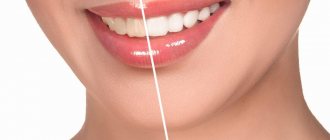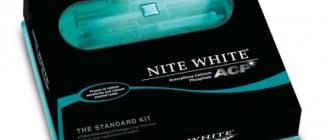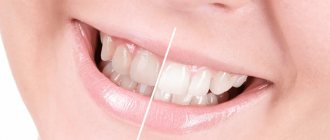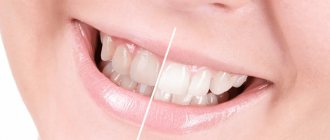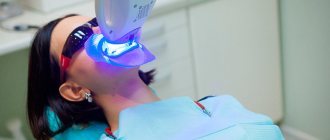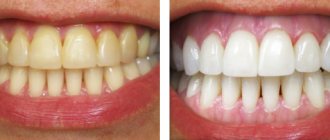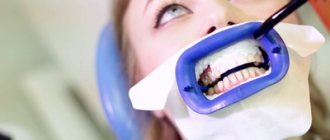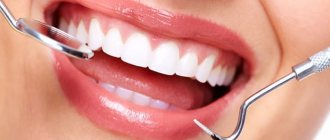A snow-white smile is the dream of every person. And everyone is interested in safe teeth whitening. Many people have heard about bad experiences from friends and the Internet and are afraid to repeat these mistakes. But the procedure has been well studied, but it is important to know which Moscow clinic can provide truly high-quality and gentle teeth whitening.
Is whitening safe?
What is teeth whitening? This is a cosmetic procedure in which the color of dentin changes (namely, the color of the tooth depends on it) - lightening by several tones under the influence of active substances. Whether it is safe or not depends on the professionalism of the dentist, as well as on the technologies and drugs that are used for these purposes (these must be registered drugs, modern methods). If we are talking about whitening at home, everything is the same, only instead of a doctor, it is the rationality of a person.
ROOTT Clinic expert on the most important things when whitening
In general, whitening is a fairly safe procedure if the teeth have good mineralized enamel, healthy gums and good oral hygiene.
Banana peel
Before starting the procedure, a prerequisite is to brush your teeth to remove plaque. Then you need to take a banana peel and rub the inside of it on your teeth for 3 minutes. We wait another ten minutes - and you can brush your teeth with regular toothpaste. Ideally, this procedure should be done morning and evening as an ongoing care. Naturally, the peel must be fresh every time. Bananas contain many elements useful for enamel (potassium, manganese, magnesium). After the first application, the result, of course, will not be noticeable, but if you carry out banana wipes at least once a day for about three weeks, the whitening will become noticeable.
Indications and contraindications
Most often, the patient prescribes the indication for whitening to himself - he is not satisfied with the aesthetic appearance of especially the front teeth, which are visible when smiling. I want it to be whiter and more dazzling.
Darkening of the enamel can also occur due to frequent intake of coffee, cigarettes, dark berries and even medications.
But there are also a number of contraindications
:
- pregnancy and lactation;
- age under 18 years;
- allergies to drugs;
- the presence of fillings, crowns, veneers (they simply do not whiten);
- bracket systems, staples;
- cancer;
- hypersensitivity;
- active caries, periodontitis or other oral diseases;
- wedge-shaped defect (dentin exposed);
- rapid abrasion of enamel;
- in some cases diabetes mellitus.
You should definitely consult with your doctor about indications and contraindications so that together you can choose a safe method for teeth whitening. And of course, carry out a complete sanitation of the oral cavity to avoid uneven color after the procedure.
Before-after photos of teeth whitening at the ROOTT clinic
Preparation rules
To increase the effectiveness of the procedure, it is necessary to properly prepare the elements of the dentition for the upcoming manipulation.
To do this, you should follow these recommendations:
- a month and a half before whitening, increase the consumption of foods high in fluoride and calcium, in particular milk, cereals, seafood, vegetables and herbs;
- use fluoride-containing toothpaste during oral hygiene;
- take vitamin and mineral complexes prescribed by your doctor.
The listed activities will help increase immunity and strengthen the enamel, which will reduce the risk of damage during the whitening process.
The best whitening toothpaste - rating among dentists and consumers.
Read reviews of whitening tooth powder for smokers here.
At this address https://zubovv.ru/krasota-i-uxod/otbelivanie/ofisnoe/kak-primenyat-karandash-dlya-luxury-white-pro.html we will talk about the pros and cons of the Luxury White Pro teeth whitening pencil.
What harm can bleaching cause?
The safest teeth whitening will be under the supervision of a professional dentist. Indeed, with inept management and the wrong approach, a number of troubles can arise:
- Negative effects on tooth enamel of incorrectly selected concentrations of bleaching agents. This is both increased sensitivity and an increase in the microporosity of its structure. Over time, the ingestion and accumulation of food dyes may cause the tooth color to become even darker than before;
- chemical burn of gum tissue due to improper isolation;
- uneven lighting.
Dentists' opinions
Despite the large number of positive responses from patients about the soda whitening procedure, dentists warn against performing this manipulation.
Their categorical nature is explained by the aggressive effect of abrasive particles on the enamel, which often results in its damage.
According to experts, it is permissible to use soda in exceptional cases. For regular hygiene, it is necessary to use several dental devices that complement each other and a special paste, which should be selected based on the condition of the teeth and gums.
One of the dentist's opinions is presented in the video.
What whitening methods are there?
The dentist will advise which teeth whitening is safe for each patient individually. But everything that takes place under the supervision of a doctor will definitely not harm - there is no doubt about it, especially when using the latest technologies, delicate compounds and modern developments.
Professional teeth whitening methods:
- Photobleaching;
- laser whitening;
- whitening gel only;
- hardware method.
The first two methods use a lamp or laser as a catalyst for the action of the whitening gel.
Photobleaching, for example, ZOOM, enhances the effect of active hydrogen peroxide, helping to quickly break it down into free radicals - oxygen atoms. of up to 10 tones occurs.
. With proper care, the results last for several years.
The laser procedure differs in that instead of a light beam, a laser beam acts. It can heat the surface, which causes sensitivity (everything is in the hands of a professional doctor, since the advantage of a laser is accuracy), and copes well with changing color by 10-12 tones
and maintaining it for up to 5 years. The downside is the high cost of the method.
Dentists are still arguing about what is the safest teeth whitening, and whether laser and light are necessary for the best results. But it has been proven that the method of applying gel without using them is also effective. Opalescence technology with 40% hydrogen peroxide in the gel is cheaper in price and has proven itself in aesthetic dentistry.
A simple dental cleaning at the clinic is often sufficient for many people. After removing stones and plaque, the teeth become several shades lighter. Using one of these methods:
- Air-Flow hardware cleaning (the principle is similar to a sandblasting machine, but instead of sand, soda);
- ultrasound.
You can be satisfied with the result of your renewed smile.
Review
Many people who have experienced the whitening properties of baking soda were satisfied with the results and plan to repeat the procedure in the future.
You can share your achievements in the matter of lightening enamel using folk remedies prepared on the basis of sodium bicarbonate in the comments to the article.
If you find an error, please select a piece of text and press Ctrl+Enter.
Tags at home teeth whitening
Did you like the article? stay tuned
Is it possible to whiten teeth safely at home?
The market offers more and more varieties of home whitening methods, whether they are safe or not - everything is individual. And the course usually lasts 10-20 days. However, not everyone is of any use.
Manufacturers offer:
- Whitening strips;
- mouth guards with active composition;
- felt-tip pens, markers;
- toothpastes with whitening effect.
All products contain the same hydrogen peroxide, but in a much lower concentration. Therefore, it will be possible to lighten and visually change the color of the enamel by 1-2 tones.
Rather, this is a lightening procedure, that is, you can safely bleach if you agree to change the shade by just a couple of tones, and are willing to spend a lot of time for a relatively small result.
But using professional products at home is not recommended. Is it dangerous.
Precautionary measures
The use of soda powder to lighten teeth, in addition to good results, can severely damage the enamel if the following safety rules are not followed during the procedure:
- you cannot arbitrarily exceed the proportions of any ingredients specified in the recipe;
- During the procedure, it is necessary to avoid excessive pressure on the dentition;
- It is advisable to use a brush with soft bristles;
- the duration and frequency of whitening procedures should not be exceeded;
- each whitening course should be completed with a two- to three-week break;
- in order to avoid the development of an allergic reaction, it is necessary to first carry out a test by applying a small amount of whitening paste to the skin in the area of the elbow;
- For each lightening procedure, it is necessary to use a freshly prepared composition.
In addition, it is worth understanding that you should refrain from the whitening procedure if there is high sensitivity and thinning of the enamel, bleeding gums and the presence of any dental diseases.
Safe whitening steps
- It is necessary
to carry out professional oral hygiene a few days - Isolation of soft
gum tissue. If you isolate the gum incorrectly, the patient will receive a severe burn, which will lead to complications. Therefore, safe teeth whitening in dentistry should only be carried out by an experienced doctor specializing in this field. - A special gel
based on hydrogen peroxide is applied. It is updated every 15 minutes: it is removed from the surface of the teeth (as it develops its properties) and a new portion is applied. The gel is changed three times. - Activation of the gel using a special lamp
. The dentist places a special lamp, the light of which will activate the gel. It is necessary to speed up the procedure and reduce it to 1 hour. The lamp has a cold LED light that does not heat the enamel structure and the procedure is comfortable for the patient. - Removing gel
from the enamel surface and all insulating materials from the gum surface. - Procedure for strengthening teeth
. A gel is applied that strengthens tooth enamel and reduces sensitivity.
Whitening is carried out in the smile zone, from 5 to 5 teeth of the lower and upper jaw. The procedure takes on average 1 hour
. Anesthesia is not given. This is necessary so that there is direct contact between the patient and the doctor, and the former can report if discomfort or pain occurs. Otherwise, you may miss the moment when something went wrong: a burn to the mucous membrane, too aggressive exposure to the material, a person’s low pain threshold.
Most popular recipes
There are many ways to whiten teeth that involve the use of baking soda. This powder can be used as a stand-alone product or supplemented with other ingredients to increase the effectiveness of the procedure.
Just soda
The use of pure baking soda as a whitening agent can be done in three ways, the most suitable of which is selected depending on the degree of sensitivity of the teeth and gum tissue:
- Cleaning with a brush. Apply a thin layer of baking soda powder to a damp, soft-bristled toothbrush. Within 60 seconds, the elements of the jaw row are cleaned using the usual sweeping movements.
After this, the oral cavity should be thoroughly rinsed with water to remove any remaining powder from the gums. The method is highly effective.After the first application, the enamel becomes smooth, yellow bacterial deposits are removed from it. The procedure can be performed no more than once every 10 days.
- Gauze swabs. The method is used for increased sensitivity of teeth and gums, due to the fact that it has less abrasive effects on them.
A teaspoon of soda is placed in a damp gauze swab, which is first diluted with water to a paste-like state.Elements of the dentition are carefully wiped with the resulting bag for 1-2 minutes, after which the oral cavity is rinsed with warm water. The effectiveness of the method is noticeable after 3-4 applications, and the risk of damage to the enamel is minimal.
- Soda rinses. In case of high sensitivity, you can use rinsing with a highly concentrated soda solution.
To prepare it, pour two teaspoons of the product into a glass of warm water and stir until completely dissolved.To obtain the whitening effect, such rinses must be carried out daily for 1-2 weeks, after which a 20-day break is taken.
With whitening toothpaste
For one-time cleaning, sodium bicarbonate powder is added to the usual volume of toothpaste in a 2:1 ratio.
The resulting product is applied to a brush with soft bristles and used to clean the elements of the jaw row.
This option helps lighten teeth without severe pigmentation. You can use this paste no more than twice a week. The first result will be noticeable after 2-3 applications.
With hydrogen peroxide
Baking soda is combined with a 3% hydrogen peroxide solution until a homogeneous mass is obtained. The pulp is applied to a toothbrush, after which the elements of the jaw row are cleaned of plaque with gentle movements.
The duration of the procedure should not exceed two minutes. The result is noticeable after the first use - teeth become 1-2 shades lighter.
This method of whitening is quite aggressive, so it should be used no more than 2-3 times a month. If your enamel is sensitive, this option will not work.
Be careful when preparing the composition - using too concentrated hydrogen peroxide can cause a burn to the mucous membrane.
With lemon
Add 5-6 drops of lemon juice onto a toothbrush coated with baking soda powder, after which the usual cleaning procedure is carried out. Instead of a brush, you can use a gauze swab .
The method is highly effective - teeth are lightened by 2-3 tones. It is not advisable to use this whitening option more than once every 15-20 days.
Lemon juice enhances the abrasive effect of calcium bicarbonate, so this option should not be used by people with increased sensitivity of the enamel, the presence of microcracks and chips on its surface.
With peroxide and lemon
To prepare the bleaching mixture, you need to combine half a teaspoon of soda and the same amount of lemon juice.
Add 5 drops of 3% hydrogen peroxide to the resulting mixture, then apply the pulp to a cotton or gauze swab, using which to carefully distribute it over the surface of the teeth, avoiding contact with the gums. After two minutes, the oral cavity should be thoroughly rinsed with plenty of water.
The result is noticeable after 2-3 sessions, which should be carried out no more than once every 7-10 days. At the same time, reviews of people who have experienced the procedure indicate that after it the sensitivity of the enamel significantly increases.
With lemon juice and salt
Lemon juice, baking soda and sea salt are combined in equal proportions to a paste.
The resulting mixture is applied to the enamel using a gauze or cotton swab and left for 2-3 minutes, after which it is washed off with warm water.
In addition to removing yellow plaque, the product helps increase the strength of the enamel and saturate it with vitamins present in sea salt.
This whitening method can be used 1-2 times a week. The result will be noticeable after 3-4 procedures.
With iodine
To prepare a brightening paste, add 3-4 drops of iodine to a teaspoon of soda and stir thoroughly with a non-metallic stick.
Next, rub the prepared composition into the tooth surface with a finger or a cotton swab and leave for 3-4 minutes, after which it is removed with a brush and water. According to numerous reviews, this method allows you to achieve lightening by 1-2 tones.
In addition to the whitening effect, the composition fights pathogenic microorganisms that live on enamel . However, there are two contraindications to the use of the prescription - the presence of endocrine diseases and the frequent occurrence of allergic reactions.
With vinegar
Heat the apple cider vinegar slightly, then add baking soda to make a medium-thick paste.
The prepared mass is distributed over the outer and inner surfaces of the elements of the dentition and left for 5-7 minutes.
After this, the whitening composition is washed off with water and the teeth are brushed using the usual method - using a brush and paste.
The whitening effect in this case occurs due to the penetration of the elements of the mixture through the pores in the enamel, thereby reducing the risk of damage.
Adherents of the method note that after 2-3 procedures, you can notice a lightening of the tooth surface by 1 or 2 tones.
With strawberry
To prepare the paste, you need to mash 2-3 washed strawberries until pureed and add half a teaspoon of soda to them. The resulting composition should be applied to a brush with soft bristles, followed by normal cleaning.
Thanks to the presence of strawberries, the abrasiveness of soda is slightly softened without losing its effectiveness. For this reason, this paste can be used 3-4 times a week, which allows you to fight even old pigmentation.
With wood ash
For bleaching purposes, prepare the following powder: mix a third of a teaspoon of soda and the same amount of wood ash.
The resulting mixture is applied to a damp brush or added to your favorite toothpaste, after which the oral cavity is thoroughly cleaned.
Mineralized plaque is removed after the first brushing of teeth using this composition. Due to the presence of highly abrasive components, it should be used no more than once every 7-10 days.
Let's find out together which foods stain teeth and how to use them correctly.
This publication contains the intricacies of the Amazing White whitening method.
Follow the link https://zubovv.ru/krasota-i-uxod/otbelivanie/ofisnoe/poleznaya-informatsiya-pro-laki-dlya.html if you are interested in the effectiveness of teeth whitening varnish.
Coconut oil
Using coconut oil works no worse than commercial mouthwashes, and it is also safer.
In its pure form, coconut oil can be used for whitening procedures 2-3 times a week; there is no need to worry about the enamel. The easiest way: hold a spoonful of coconut oil in your mouth, then rinse your teeth thoroughly with it for 5 minutes. You can also apply a little oil to a cotton pad and wipe the surface of your teeth. They also advise mixing it with baking soda and brushing your teeth with this mixture.
Properties of soda
Sodium bicarbonate can disinfect surfaces as an antiseptic, which is good for whitening
The unique properties of soda have made the product popular in various areas of human life, this is explained by the three main properties of the powder: antiseptic, regenerating, cleansing.
Antiseptic properties
Sodium bicarbonate can disinfect surfaces as an antiseptic.
This property has a positive effect on enamel whitening. Thanks to him, the procedure prevents harmful bacteria from entering the oral cavity.
Regenerating properties
Sodium accelerates skin regeneration by affecting metabolic processes in cells. When teeth whitening, it has a beneficial effect on the condition of the gums and improves their condition.
Cleansing properties
Large powder particles are capable of removing a thin layer of the surface. This applies to both plaque and tooth enamel. Soda owes its instant effect to this property.
